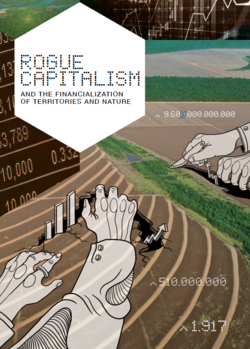FIAN International, the Transnational Institute and Focus on the Global South | 24 September 2020
Finance capitalism and the rush for natural resources
A new report explores how global finance has transformed land and nature into financial assets, driving violence and environmental destruction.
The report ‘Rogue Capitalism and the Financialization of Territories and Nature’ published today by FIAN International, the Transnational Institute and Focus on the Global South looks into the architecture of global finance and its tactics to extract wealth from natural resources.
Some highlights include:
- Finance capitalism has put a price tag on land and natural resources: The estimated value of the global real estate market is $217 trillion, making land and housing a key target for financial actors.
- Banks, funds, asset management companies and ultra-rich individuals use trillions of dollars gambling with land and other natural resources to make a profit. They operate through a small number of tax havens and offshore financial centers to avoid regulation and taxation.
- As more than 20 examples contained in the report show, the extraction of wealth from natural resources happens through a broad range of mechanisms, ranging from the expansion of agricultural monocultures to intensive aquaculture, infrastructure projects, real estate development, mining and carbon markets. The common feature is the dispossession of local people and environmental destruction.
- Big finance is a key driver of climate change: the current rush for land is fueling deforestation and greenhouse gas emissions at the same time as market-based mitigation schemes provide new investment opportunities, as illustrated by countries like Brazil and Indonesia.
-
Big data and digital technologies play a key role in opening up new markets and investment opportunities for the global elites and finance firms like BlackRock.
Climate change, social inequalities and the democratic crisis – the critical global challenges of our times – are all tied to an economic system that is dominated by financial markets. Global finance, the report argues, is causing ever increasing dispossession of rural and urban communities around the world, destroying their lands, rivers, forests and homes.
“After discussions with small-scale food producers’ organizations and social movements, we have come to the conclusion that what is often referred to as ‘financialization’ should rather be called ‘rogue capitalism’ because global finance’s grab of people’s territories is illegitimate and destructive, and because the involved actors actively seek to hide their operations,” says Philip Seufert, from FIAN International, one of the publishers.
Deregulation policies and new financial tools are facilitating profitable investment ventures, such as deforestation, the expansion of monoculture plantations, fossil fuels, infrastructure, carbon offsets, microcredits and digitalization. At the same time, tax havens and offshore financial centers allow them to evade accountability and taxation. For peasants, indigenous peoples, artisanal fishers and other communities, the consequences are dramatic and violence is on the rise. In addition, global warming and the destruction of nature continue at alarming rates.
“Our governments have created the conditions for rogue capitalism to flourish through public-private partnerships, public pension funds and development cooperation. They have further conceded a privileged seat at the table of global decision-making to financial companies like BlackRock, Blackstone and Vanguard,” says Shalmali Guttal of Focus on the Global South.
As the report highlights, digital technologies are playing a key role in transforming people’s territories and nature into financial assets. Companies collect and analyze huge amounts of data to optimize their operations. Lands, rivers, forests as well as people, plants, animals and micro-organisms are transformed into codes and algorithms to calculate risks and rates of return. As such, digital agriculture and “smart” cities pose new threats to communities.
But another world is in sight: In places like Indonesia, Argentina, Mali and Spain as well as at the UN level, social movements and organizations are opposing rogue capitalism and are realizing their vision of a world that is organized around the need of communities instead of corporate profits, as the report tells.
‘Rogue Capitalism and the Financialization of Territories and Nature’ aims to sheds light on the way contemporary capitalism works and to present critical questions to strengthen a people’s counter offensive.
Please find final report here













